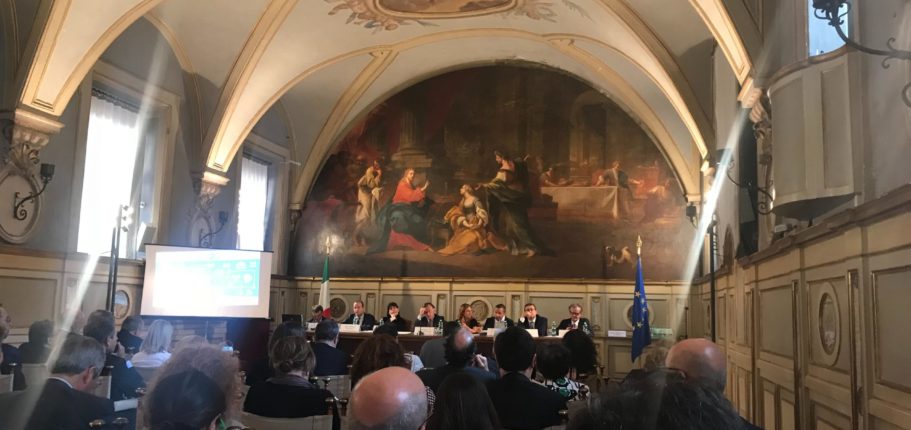L'Autorità Garante della Concorrenza e del Mercato, in data 26 luglio, ha autorizzato con condizioni…
“Big Data: Connessioni e pluralismo”. Il video del convegno svoltosi occasione della ricorrenza del ventennale AGCOM

Il video dell’evento di Radio Radicale https://www.radioradicale.it/
The Italian Communications Regulatory Authority presented a Report on big data in a Conference at the House of Parliament with the following speakers:
Antonio Martusciello (Italian Communications Regulatory Authority member)
70% of people get information from traditional media and innovative media combined. Pollsters noticed how M5S, which is an Internet based party, gained momentum when TV news started to talk about them. Polarization of opinions is an issue.
Fabrizio Carotti (FIEG, Association of Publishers)
The regulatory framework for publishers and online platforms is too different. Data should be defined as a separate relevant market. Big tech corporates revenues from adv double publishers’ revenues from adv.
Marco Pratellesi (AGI, News agency)
We provide fact-checking statements everyday, but it’s an expensive and slow process in comparison of the spread of fake news through social networks.
Luca Sanfilippo (Sky Italia)
On June 12th the USA Antitrust verdict about AT&T and Warner is expected. In case it will be positive, it will set a precedent. Moreover, the Authority should deal with correct information.
Gian Paolo Tagliavia (Rai)
Rai as a public service has to decide whether using commercial practice. In the digital ecosystem, users expect customized services. Should Rai treat equally italian and foreign contents? Algorithms are part of the editorial plan.
Andrea Stazi (Google)
The activity of the Authority helps users’ awareness. GDPR made more explicit the relationship between users and platforms. Google thinks users are crucial and their trust is fundamental. In order to use Google services sharing data is not necessary, even though if users share their data they get better services.
Fake news come as a consequence of openness, but a closed Internet is unimaginable. Google take into great consideration values in its business model. In particular we just published Google principles on Artificial Intelligence. Platforms should not deal with censorship. UN and UNESCO reports affirm that limiting algorithms in advance may be risky for fundamental freedoms. Fact-checking is very useful, but it cannot exist a truth-custodian.
Spreading a digital culture is crucial. As President Mattarella recently said to Youtubers: “Through the Internet you can reach everybody. the Internet is a tool of peace because it allows mechanisms of solidarity inimaginable before.”
Laura Bononcini (Facebook)
Dealing with a bunch of uncategorized information is extremely difficult. The goal of our algorithm is helping users in having high quality information. Newsfeed is based on people’s activity and people look for dialogue. Facebook fights against fake news everyday. 500 millions fake profiles and 800 millions spam messages have been removed. Fact checking is really important and it’s important providing a context when publishing news. We’ll introduce more transparency on political adv.
The autoregulation process (through informal tables by EU and Italian Communications Regulatory Authority) worked pretty well so far. We are not prejudicially against regulation.
Gina Nieri (Mediaset)
Algorithms lack of transparency. Regulation approach needs to be totally revised. As platforms are global is really difficult regulate them.
Related articles:
Il Convegno “Big Data. Connessioni e Pluralismo”, si è svolto venerdì 8 giugno 2018, organizzato dall’Autorità per le Garanzie nelle Comunicazioni.
Sono intervenuti: Angelo Marcello Cardani (presidente dell’Autorità per le Garanzie nelle Comunicazioni), Filippo Arena (capo di Gabinetto dell’Autorità Garante della Concorrenza e del Mercato), Giuseppe Busia (segretario generale dell’Autorità Garante per la Protezione dei Dati Personali), Antonio Nicita (commissario dell’Autorità per le Garanzie nelle Comunicazioni), Francesco Posteraro (commissario dell’Autorità per le Garanzie nelle Comunicazioni), Massimiliano Gattoni (capo innovazione digitale di Open di Open Fiber), Agostino Nuzzolo (segretario del Consiglio di Amministrazione e responsabile degli affari legali di Telecom Italia), Isabella De Michelis (componente CEO e fondatore di Ernieapp), Antongiulio Lombardi (componente del servizio legale,conformità e regolamentazione di Wind/3), Andrea Fregosi (manager di Fastweb), Andrea Stazi (responsabile delle politiche pubbliche e ralazioni governative di Google Italia), Romano Righetti (direttore External affairs di Vodafone Italia), Luigi De Vecchis (executive vice presidente di Huawei Italia), Antonio Martuscello (commissario dell’Autorità per le Garanzie nelle Comunicazioni), Fabrizio Carotti (direttore generale della Federazione Italiana Editori Giornali (FIEG)), Marco Pratellesi (condirettore dell’AGI), Luca Sanfilippo (consigliere generale di Sky Italia), Gian Paolo Tagliavia (direttore della direzione Digital della Rai), Laura Bononcini (responsabile dei Rapporti Istituzionali di Facebook Italia), Gina Nieri (direttore della Divisione Affari Istituzionali Legali e Analisi Strategiche di Mediaset).
—








